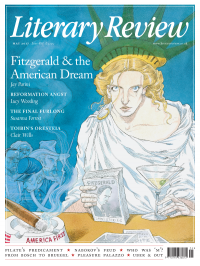Jerry Brotton
‘The Play’s the Thing’
Discussion of the impact of digital technology on books has been largely confined to hysterical pronouncements about the death of the printed book, but we might be looking in the wrong direction. It’s now clear that e-books and Kindles will not see off physical books any time soon. Last year 360 million printed books were sold in the UK, an increase of 2 per cent on the previous year. By contrast, e-book sales declined by 4 per cent. If the virtual book revolution is looking like the dog that failed to bark, there is digital bite elsewhere. Over the last two decades, the tools of digital data analysis have been grasped enthusiastically by literary scholars. The result has been a quiet revolution in book history that has not only changed the way we interpret texts but also altered our understanding of how books have been made, published and read, and of the ways in which the role of the author has evolved over time.
Nowhere has this digital revolution been more far-reaching than in the understanding of Shakespeare. Anyone working in Shakespeare studies will turn to digital resources to uncover Shakespeare’s ‘paratexts’ – the patrons, printers and editors involved in publishing his plays, their prefaces, commentaries, title pages, illustrations, even the typography and paper

Sign Up to our newsletter
Receive free articles, highlights from the archive, news, details of prizes, and much more.@Lit_Review
Follow Literary Review on Twitter
Twitter Feed
Margaret Atwood has become a cultural weathervane, blamed for predicting dystopia and celebrated for resisting it. Yet her ‘memoir of sorts’ reveals a more complicated, playful figure.
@sophieolive introduces us to a young Peggy.
Sophie Oliver - Ms Fixit’s Characteristics
Sophie Oliver: Ms Fixit’s Characteristics - Book of Lives: A Memoir of Sorts by Margaret Atwood
literaryreview.co.uk
For a writer so ubiquitous, George Orwell remains curiously elusive. His voice is lost, his image scarce; all that survives is the prose, and the interpretations built upon it.
@Dorianlynskey wonders what is to be done.
Dorian Lynskey - Doublethink & Doubt
Dorian Lynskey: Doublethink & Doubt - Orwell: 2+2=5 by Raoul Peck (dir); George Orwell: Life and Legacy by Robert Colls
literaryreview.co.uk
The court of Henry VIII is easy to envision thanks to Hans Holbein the Younger’s portraits: the bearded king, Anne of Cleves in red and gold, Thomas Cromwell demure in black.
Peter Marshall paints a picture of the artist himself.
Peter Marshall - Varnish & Virtue
Peter Marshall: Varnish & Virtue - Holbein: Renaissance Master by Elizabeth Goldring
literaryreview.co.uk